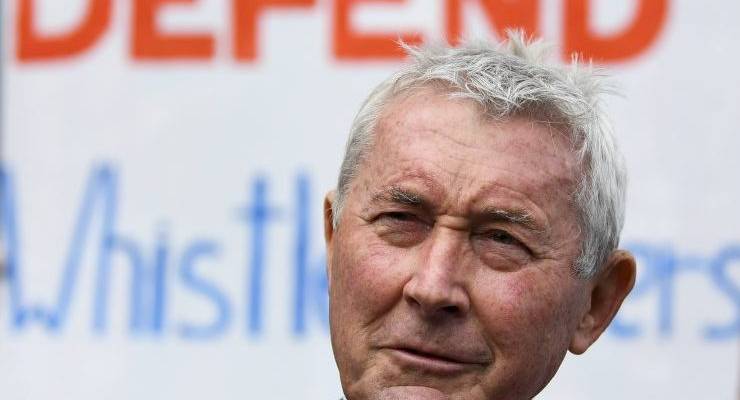
Shadow attorney-general Julian Leeser yesterday used parliamentary privilege to make an extraordinary and false attack on Attorney-General Mark Dreyfus’ decision to end the prosecution of Bernard Collaery, alleging it may have been because “Collaery was an attorney-general in the ACT Labor government”.
Leeser’s claim is blatantly wrong: Collaery was attorney-general in an ACT Liberal government under Trevor Kaine from 1989 to 1991, after helping bring down a minority Labor government in December 1989. Leeser — who was 13 at the time — clearly has little grasp of the history of the Canberra Liberals.
Asked by Crikey what evidence he had about a link between Collaery and Labor, Leeser declined to respond.
His misrepresentation of Collaery was part of a broader attack on Dreyfus over his decision to end the vexatious prosecution of Bernard Collaery by the Coalition, which was intended as punishment for Collaery’s role in the exposure by Witness K of the potentially illegal bugging of the Timor-Leste cabinet by the Howard government.
Leeser used an obscure consideration in detail process in the Federation Chamber to ask a lengthy question of Dreyfus, before hastily exiting the room prior to Dreyfus responding.
Calling Dreyfus’ decision “extraordinary and unexplained”, Leeser repeated the accusations against Collaery and K and quoted former director of public prosecutions (DPP) Sarah McNaughton — the former trade union royal commission counsel hand-picked for the DPP job by the Coalition — claiming the prosecution was in the public interest.
In fact at no stage during the extended legal harassment of Collaery did McNaughton explain how the prosecution was in the public interest — a fact noted by Dreyfus before the election.
“What message does this send to people who might deal in Australia’s secrets?” Leeser said. “What warranted this action?”
As well as falsely accusing Collaery of being a Labor attorney-general, Leeser said “Did Mr Collaery represent himself to the attorney-general and make those requests? How many legal activists put pressure on the attorney-general to make this decision? What public interest has been served by the attorney-general’s intervention here?”
Among the “legal activists” who called for an end to the persecution of Collaery were the Australian Bar Association, the ACT Bar Association, Professor Spencer Zifcak of the Australian Catholic University (where Leeser worked before entering politics) and the Australian Lawyers’ Alliance,
Leeser’s claim that ending the prosecution of Collaery sends the wrong message to “people who might deal in Australia’s secrets” again raises the possibility that, on returning to power, the Coalition might again move to prosecute Collaery via another hand-picked DPP. Leeser has previously refused to rule this out, and again refused to rule that out today when asked by Crikey.
Having not let decency stand in the way of its persecution of Collaery, it now seems the Coalition won’t let the facts get in the way either.








Thanks BK and Crikey for continuing to bring the ins-and-outs of this case to public attention. It is one of the most shameful episodes of the relentless abuse of parliamentary privilege that I can recall in my 81 years.
Here Hear, I have attended, all Collaery protests outside Christain Porter and Linda Reyolds offices, hers in Perth We need ICAC
Continuing to gaslight in order to protect the ‘legacy’ of Howard and Downer. No shame.
Downer’s file of dodgy dealings must be a foot thick by now.
Howard’s is probably even thicker!
Probably hoping to protect the grace and favour house in London for Alexander and Toned Abs.
“No shame” – did we expect any? Thank you Bernard for pointing out Leeser’s “Labor” not “Liberal” fact. This pursuit of Clleary has been disgraceful behaviour by the Coalition and now is having the effect of focusing renewed attention on Howard and Downer.Which wouldn’t have been Leeser;s intention. I wonder how that will pan out..
It’s quite simple. Allow Collaery to release all the facts around the case. There is substantial pubic interest in allowing this to happen, which would certainly end any future legal action. Now, if the AG could now see sense and drop the cases against David McBride and Richard Boyle, we may be getting to some point of integrity .
Indeed. I am still asking myself why the charges in the other equally deserving cases have not been dropped.
Here, here.
The only reason to drop them against Collaery was to mend ties with the Pacific (TL obviously in particular) ie diplomacy reasons. The reason was narrowly formulated to try to minimise the chances for it to apply it to Boyle and McBride.
Or in other words, they are just playing politics and don’t care about whistleblowers, any more than the LNP!
With all due respect,Julian Leeser sounds like a real scumbag…
Sounds like?
Due respect ??
Well, if you trod on him on the street the smell might force you to scrape the residual off the sole of your shoe and find a plastic bag to take your shoe home in.
A hose job at home.
ICAC Now